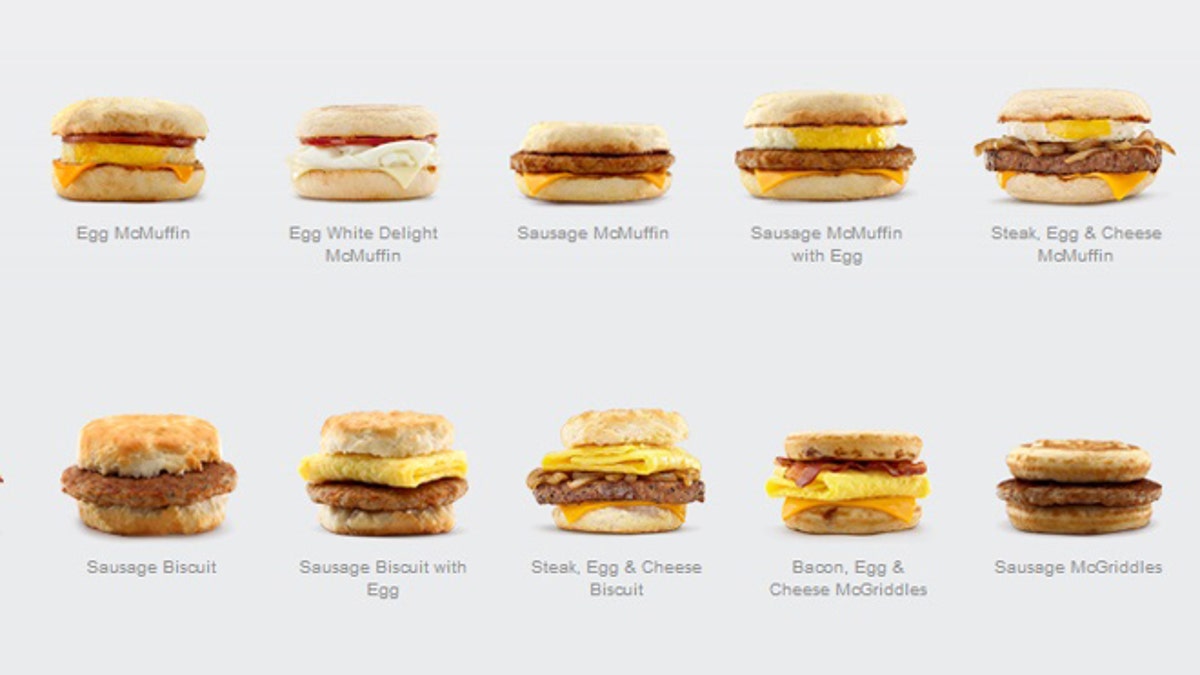
Most of McDonald's most popular morning sandwiches contain eggs. (McDonalds.com)
As the latest avian flu epidemic continues to annihilate U.S. chicken flocks, America's largest fast food chain may have to rethink breakfast.
Poultry producers that supply McDonald’s with eggs, such as Cargill, are warning that the effects of the outbreak is threatening egg production. The Golden Arches owns about 20 percent of the restaurant breakfast market, according to Sanford C. Bernstein analysts, which accounts for one fifth of the company's $28 billion annual revenue.
Growing concern over the country's egg supply comes as McDonald's continues to struggle with dipping revenues and as it plans to roll out an all-day breakfast menu nationwide.
According to the US Department of Agriculture (USDA), over 46 million chickens and turkeys have been infected since last December, with egg-laying hens accounting for almost 80 percent of the affected population. That means restaurants are scrambling to find more eggs.
In May, McDonald’s told the NYTimes that it would be business as usual for McMuffin lovers, despite the influenza crisis.
“One of our suppliers has been directly impacted by avian influenza despite their taking appropriate biosecurity precautions,” Lisa McComb, a spokeswoman for McDonald’s, wrote in an e-mail to the NYTimes. “We proactively developed contingent supply plans, and we do not anticipate an impact to our ability to supply eggs to our restaurants and serve our customers.”
Yet, many food companies like McDonald’s, Panera Bread, Unilever and General Mills, are seeking other suppliers and substitute ingredients, while others have already begun to scale back production.
Whataburger announced that it was limiting breakfast hours at 770 restaurants across 10 states. Normal hours are 11 p.m. to 11 a.m. have been truncated from 5 a.m. 9 a.m. during the week and 5 a.m. to 11 a.m. on the weekend.
Grocery chain H-E-B, which operates over 350 supermarkets, has started rationing eggs to cope with the crisis. "Eggs [are] not for commercial sale," read warnings the warnings printed next to egg displays in stores, reports the Washington Post. "Customers may purchase up to three cartons of eggs at a time.
Even companies in which eggs are not a main part of the business, have been forced to carefully evaluate current supply lines, and strategize contingency plans, as the crisis continues. Paul Ray, Panera’s vice president for sourcing, told the NYTimes that it can take time to forecast what impact, if any, the shortage will have on their foods. Eggs are included in some of the fast casual chain’s recipes like cookies.
The USDA currently estimates that the worst of the influenza outbreak will be over by July but warned against additional localized flare-ups that could further affect poultry populations. That potential for more outbreaks means even the golden arches may not be safe from potential menu limits.
